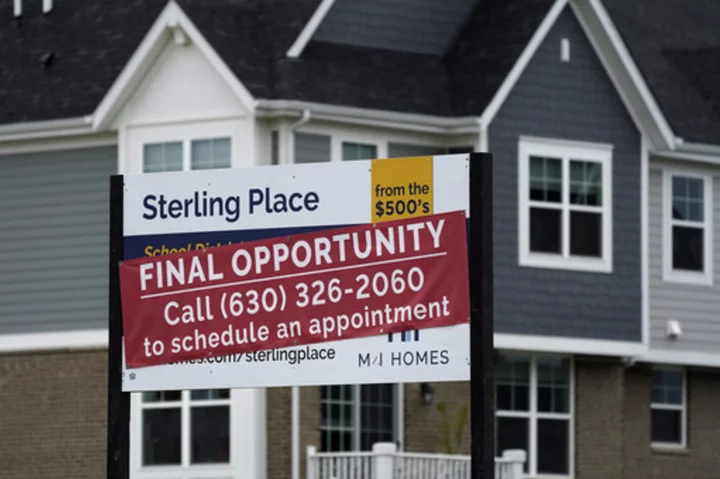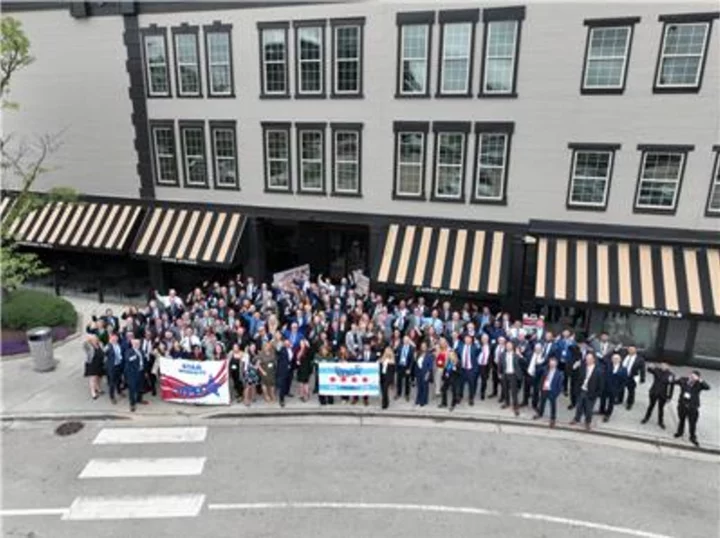LOS ANGELES (AP) — The average long-term U.S. mortgage rate climbed to a new high for the year this week, pushing up borrowing costs for homebuyers already facing heightened competition in a housing market short on homes.
The average rate on the benchmark 30-year home loan rose to 6.81% from 6.71% last week, mortgage buyer Freddie Mac said Thursday. A year ago, the rate averaged 5.30%.
It's the second consecutive week of higher rates, lifting the average rate to its highest level since it surged to 7.08% in early November. High rates can add hundreds of dollars a month in costs for borrowers, limiting how much they can afford in a market already unaffordable to many Americans.
"These high rates combined with low inventory continue to price many potential homebuyers out of the market,” said Sam Khater, Freddie Mac’s chief economist.
The latest uptick in mortgage rates follows a sharp upward move in the 10-year Treasury yield, which climbed above 4% this week for the first time since early March. More surprisingly hot jobs data Thursday pushed yields on the 10-year Treasury to 4.05% from 3.94% late Wednesday, which will influence mortgage rates and other important loans.
Mortgage rates don’t necessarily mirror the Fed’s rate increases, but tend to track the yield on the 10-year Treasury note. Investors’ expectations for future inflation, global demand for U.S. Treasurys and what the Fed does with interest rates can influence rates on home loans.
Beginning with its first hike in March 2022, the Fed has lifted its benchmark interest rate to about 5.1%, its highest level in 16 years, before forgoing a hike at its meeting of policymakers last month.
But the economy has been surprisingly resilient despite the Fed’s rate hikes, defying long-standing forecasts of a recession. A measure of the economy’s growth in the first three months of the year was sharply upgraded last week to a solid annual pace of 2%, from a previous estimate of 1.3%.
And recent data from the government showed a mixed picture of inflation. Lower gas prices and slower-rising food costs are helping to cool inflation, but persistently high “core” prices, a category that excludes volatile food and energy costs, remain elevated.
Some Fed officials wanted to raise rates last month, according to minutes from the June meeting released Wednesday. The minutes echoed previous comments from Fed Chair Jerome Powell that the central bank will likely keep raising rates this year, with a hike at its next meeting later this month considered highly likely.
On Friday, the U.S. government will report its latest monthly update on hiring across the economy, as well as how much wages are rising for workers. It’s one of the last big pieces of data left before the Federal Reserve meets next on interest rate policy.
The average rate on a 30-year mortgage remains more than double what it was two years ago, when ultra-low rates spurred a wave of home sales and refinancing. The far higher rates now are contributing to the low level of available homes by discouraging homeowners who locked in those lower borrowing costs two years ago from selling.
The dearth of properties on the market is also a key reason home sales have been slow this year. Last month, sales of previously occupied U.S. homes were down 20.4% from as year earlier, marking 10 consecutive months of annual declines of 20% or more, according to the National Association of Realtors.
The average rate on 15-year fixed-rate mortgages, popular with those refinancing their homes, also rose this week, climbing to 6.24% from 6.06% last week. A year ago, it averaged 4.45%, Freddie Mac said.









